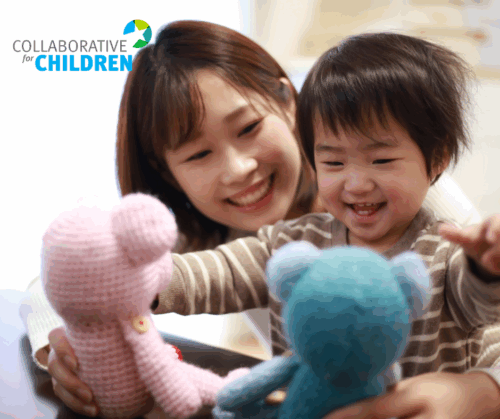When it comes to early childhood development, how we praise children matters just as much as what we praise. Neuroscience shows that overheard praise, like bragging about a child’s good behavior to their stuffed animals, activates the brain’s reward systems in a deeper, more meaningful way than direct praise.
At Collaborative for Children, we help parents and educators use proven science-backed strategies to nurture intrinsic motivation, emotional intelligence, and self-confidence in children ages 0–5. Our certified early childhood education (ECE) programs and child care centers of excellence are designed to support the whole child; cognitively, socially, and emotionally.
According to the video, when a parent praises their child indirectly, by speaking to a stuffed animal or another adult within earshot, the child perceives the praise as more authentic. This activates the intrinsic motivation centers of the brain, helping children absorb the praise as part of their identity, not just a reaction to their behavior.
This method:
– Encourages self-driven behavior
– Builds long-term confidence
– Strengthens emotional regulation
– Supports healthy brain development
These benefits align with Collaborative for Children’s mission to prepare children for lifelong success through intentional, research-based early learning experiences.
In our child care Centers of Excellence, educators use praise strategically to reinforce positive behavior and emotional development. Rather than simply saying “good job,” teachers might say, “I saw how gently you helped your friend—Ms. Bunny is so proud of you!” This playful, indirect praise helps children feel seen and valued.
Our certified ECE curriculum includes:
– Social-emotional learning activities
– Role-playing and storytelling
– STEAM-based exploration that encourages collaboration
– Daily routines that build empathy and self-awareness
These experiences help children develop a strong sense of self and a natural desire to do good. Not just to earn approval, but because it feels right

Stuffed animals aren’t just toys, they’re tools for emotional connection and cognitive growth. When parents use them to deliver praise, they tap into a child’s imagination and emotional world. This method is especially effective for children who are shy, sensitive, or neurodivergent.
Overheard praise activates intrinsic motivation centers in the brain, helping children internalize positive feedback as part of their identity rather than just a reward for behavior.
Our educators use indirect praise, storytelling, and role-play to reinforce emotional growth and positive behavior in ways that feel authentic and empowering to children.
Yes. Praising your child to their stuffed animals or other adults within earshot helps build self-confidence and emotional intelligence. We offer coaching and resources to help parents use these techniques effectively.